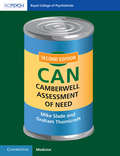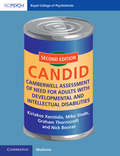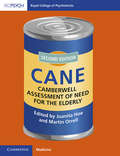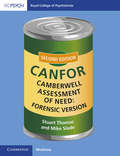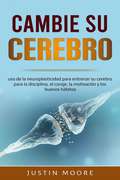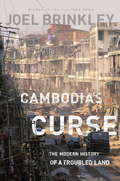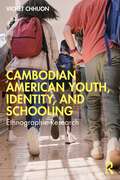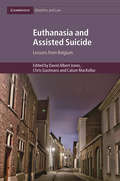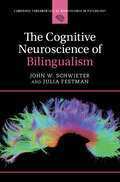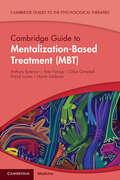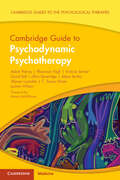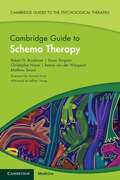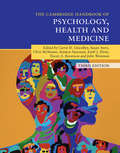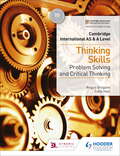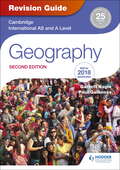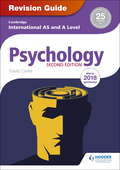- Table View
- List View
Camberwell Assessment of Need (CAN): Camberwell Assessment Of Need For Mothers
by Graham Thornicroft Mike SladeThe Camberwell Assessment of Need (CAN) has been the key measure for assessing the health and social needs of people with mental health problems for decades. Aimed at mental health workers or researchers, it is suitable for clinical use in both community-based and hospital-based mental health services. Updated chapters bring guidance into line with modern social contexts, for example questions regarding 'Child Care' now focus on 'Dependents', reflecting changes relating to an ageing population. An extensive training programme and list of frequently asked questions are informed by the authors' decades of experience in using this essential resource. Containing four versions of the CAN (CANSAS, CANSAS-P, CAN-C, CAN-R) for use in different situations, systematic guidance for how to complete the assessments is also included in the book. Ready to use assessment forms are freely available to download from the CAN website (researchintorecovery.com/can) and on cambridge.org for use with service users.
Camberwell Assessment of Need for Adults with Developmental and Intellectual Disabilities: CANDID
by Nick Bouras Graham Thornicroft Mike Slade Kiriakos XenitidisThe Camberwell Assessment of Need for adults with Developmental and Intellectual Disabilities (CANDID) is a widely used tool for the assessment of health and social needs of people with intellectual disabilities and mental health problems. It uses the assessment approach adopted by CAN, the world's leading mental health needs assessment measure. Two versions of the CANDID are available: CANDID-S (short version) and CANDID-R (research version). Both versions are aimed at researchers and practitioners working with people with intellectual disabilities, and are suitable for clinical use in community and hospital-based services. Fully updated based on current policy, practice and terminology, this second edition introduces a more intuitive need rating system and an accessible rating algorithm. Guidance on how to use the measures is provided, as well as an overview of research developments since the first edition. The assessment forms are freely available to download from the CAN website (researchintorecovery.com/can) and cambridge.org.
Camberwell Assessment of Need for the Elderly: CANE
by Martin Orrell Juanita HoeThe Camberwell Assessment of Need for the Elderly (CANE) is an internationally accepted tool for assessing the needs of older people. Needs are assessed in twenty-four areas of life and cover a broad range of health, social and psychological domains. Two items that measure the needs of those who care for the older person are also included. The CANE is suitable for use in research, clinical practice and for evaluating health and social services provided to older people. It has been used for over twenty years in a range of settings, populations and countries. This book outlines the evidence for its use in effectively measuring the needs of older people across primary care, community, inpatient and care home settings. Both the full version CANE and short version (CANE-S) are included, along with a detailed manual and scoring guidance. The assessment forms are freely available to download from researchintorecovery.com/can and cambridge.org.
Camberwell Assessment of Need: CANFOR
by Mike Slade Stuart ThomasThe Camberwell Assessment of Need Forensic Version (CANFOR) is a tool for assessing the needs of people with mental health problems who are in contact with forensic services. It is based on the CAN, a widely used needs assessment for people with severe mental health problems. Individual needs are assessed in 25 areas of life, spanning health, social, clinical and functional domains. Comprehensive versions are available for research (CANFOR-R) and clinical use (CANFOR-C), as well as a short summary version (CANFOR-S) suitable for both research and clinical use. CANFOR was rigorously developed by a multidisciplinary team at the Institute of Psychiatry, London, and is suitable for use in all forensic mental health and prison settings. This second edition provides an update of the CANFOR tools and their application in clinical and research settings. The assessment forms are freely available to download from the CAN website (researchintorecovery.com/can) and cambridge.org.
Cambia tu Cerebro: para entrenar su cerebro para la disciplina, el coraje, la motivación y los buenos hábitos
by Justin MooreCambiar de cerebro no se trata solo de adquirir un hábito específico. Está tomando la resolución de cambiar su estilo de vida para crear la vida que desea tener. Si quieres una vida social robusta y una carrera exitosa, nunca lo conseguirás reteniendo por miedo a decir algo incorrecto. Las personas que prosperan en sus carreras son dueños de sus vidas. Han infundido confianza en sí mismos para que sus mentes los alienten. Se aseguran de que sus manos sean las que están en el volante del vehículo que es su vida. No hacen esto tratando de alcanzar el control sobre cada parte de sus vidas, sino dejando de lado lo que no tienen ningún impacto. Esto libera su tiempo y energía para que puedan concentrarse en lo que pueden controlar, que es su propio comportamiento. La vida está llena de contratiempos. Eso no es algo que podamos cambiar. Lo que podemos hacer es reaccionar ante ellos de una manera que funcione para encontrar una solución para ellos, o no. Para lograr lo primero, debes trabajar por lo que dices que quieres. Piensa en un momento en que has hecho algo con poca confianza en tu capacidad para hacerlo, y tu corazón no estaba en eso, por ejemplo, ir a una presentación cuando no te sientes bien. Ahora piense en cuándo sintió lo contrario: sentirse mejor, gustarle su aspecto y estar seguro de saber lo que se suponía que debía hacer. ¿En qué caso fue mejor tu rendimiento? Es por eso que cambiar tu cerebro está cambiando lo que puedes lograr. Si ha decidido que no puede hacer algo, terminará antes de que comience. Tal vez decidas que no sabes nada sobre una profesión, por lo que nunca podrías hacer una entrada al campo, o que nunca has sido del tipo social, por lo que no tiene sentido retomarla en este momento. No importa dónde se encuentre en su vida, nunca es demasiado tarde para cambiarlo. Tal vez no sea el pasado, pero las elecciones que haga ahora decidirán si su vida continúa de la misma
Cambodia's Curse: The Modern History of a Troubled Land
by Joel BrinkleyA generation after Pol Pot's regime killed one quarter of the nation's population, Cambodia shows every outward sign of having overcome its devastating history – the streets of Phnom Penh are paved; skyscrapers dot the skyline. But behind this façade lies a country still haunted by its years of terror. In 1992, the world came together to help pull the small nation out of the mire. Cambodia became a United Nations protectorate – the first and only time the UN has tried something so ambitious. What did the new, democratically elected government do with this unprecedented gift?In 2008 and 2009, Joel Brinkley – who won a Pulitzer Prize for his reporting on the fall of the Khmer Rouge – returned to Cambodia to find out. He discovered a population in the grip of a venal government. He learned that between one third and one half of Cambodians who lived through the Khmer Rouge era suffer from post-traumatic stress disorder, and that its afflictions are being passed to the next generation. His extensive close-up reporting in Cambodia's Curse illuminates the country, its people, and the deep historical roots of its modern-day behaviour. This is a devastating and important look at Cambodia today.
Cambodian American Youth, Identity, and Schooling: Ethnographic Research
by Vichet ChhuonThis book examines how Cambodian American high school youth reconcile stereotypes, identities, and school opportunities and the ways these factors impact academic achievement and well-being, through ethnographic research.The backdrop for Cambodian American life is intimately embedded within how Asians and Asian Americans are imagined within U.S. society. This book argues that how Cambodian American students negotiate certain identities are in relation to perceived advantages associated with ethnic and panethnic labels across varying social contexts. It highlights how the embrace of the model minority stereotype can come at a psychological cost for Asian Americans including increased feelings of internalized racism. The chapters draw on ethnographic research collected across two years in one Southern California community. Through students’ own meaning-making, it shows readers how Cambodian American youth are simultaneously invisible and hyper-visible in their school and community, which shapes access to important identities and relationships. This work invites interrogation of the Asian American category itself and seeks to move the fields of Asian American and educational studies forward by critically examining not only how the model minority stereotype is constructed and imposed but also how it can be adopted and affirmed by Asian American youth themselves.Practitioners who work with marginalized and underrepresented students and students of courses such as Asian American studies, anthropology, cultural studies, and education and psychology will find this to be a helpful and enlightening text. The accessible and clear writing makes this book of interest to a general audience as well.
Cambridge Approaches to Language Contact: The Emergence of Hybrid Grammars
by Enoch Oladé AbohChildren are extremely gifted in acquiring their native languages, but languages nevertheless change over time. Why does this paradox exist? In this study of creole languages, Enoch Aboh addresses this question, arguing that language acquisition requires contact between different linguistic sub-systems that feed into the hybrid grammars that learners develop. There is no qualitative difference between a child learning their language in a multilingual environment and a child raised in a monolingual environment. In both situations, children learn to master multiple linguistic sub-systems that are in contact and may be combined to produce new variants. These new variants are part of the inputs for subsequent learners. Contributing to the debate on language acquisition and change, Aboh shows that language learning is always imperfect: learners' motivation is not to replicate the target language faithfully but to develop a system close enough to the target that guarantees successful communication and group membership.
Cambridge Bioethics and Law: Lessons from Belgium (Cambridge Bioethics and Law #42)
by Jones Calum Mackellar Chris Gastmans David AlbertExamining the evidence from Belgium - one of only five countries where euthanasia is practised legally - an international panel of experts considers the implications of legalised euthanasia and assisted suicide. Looking at the issue from an international perspective, the authors have written an invaluable in-depth analysis of the ethical aspects of this complex area. The discussion forms a solid foundation for informed debate about assisted dying. With contributors from a broad range of disciplines, this book is ideal for students, academics, legislators and anyone interested in legal, medical, social and philosophical ethics. A vital and timely examination of a growing phenomenon and one of the most challenging ethical questions of our time.
Cambridge Companions to Management: Mindfulness in Organizations:
by Jochen RebMindfulness techniques, having long played an important role in contemplative traditions around the world, are now recognized as having the potential to transform workplaces. As interest in the role of mindfulness in organizational settings continues to increase, this timely book fills a gap in the literature by providing an overview of the latest theoretical and empirical research on workplace mindfulness. It brings together world-leading scholars to explore the foundations, key discussions, diversity of approaches and applications of mindfulness in organizations. It acts as a catalyst for future research on the topic by suggesting research directions and stimulating organizational researchers to embark on new projects involving mindfulness. Furthermore, it provides valuable ideas for implementing mindfulness programs in organizations, for teaching mindfulness in business contexts, and for coaching with mindfulness. This must-read book will appeal to researchers and professionals in the fields of organizational behavior, organizational psychology and employee well-being.
Cambridge Fundamentals of Neuroscience in Psychology: Cognitive Neuroscience of Memory
by Scott D. SlotnickWithin the last two decades, the field of cognitive neuroscience has begun to thrive, with technological advances that non-invasively measure human brain activity. This is the first book to provide a comprehensive and up-to-date treatment on the cognitive neuroscience of memory. Topics include cognitive neuroscience techniques and human brain mechanisms underlying long-term memory success, long-term memory failure, working memory, implicit memory, and memory and disease. Cognitive Neuroscience of Memory highlights both spatial and temporal aspects of the functioning human brain during memory. Each chapter is written in an accessible style and includes background information and many figures. In his analysis, Scott D. Slotnick questions popular views, rather than simply assuming they are correct. In this way, science is depicted as open to question, evolving, and exciting.
Cambridge Fundamentals of Neuroscience in Psychology: The Cognitive Neuroscience of Bilingualism (Cambridge Fundamentals Of Neuroscience In Psychology Ser.)
by John W. Schwieter Julia FestmanCambridge Guide to Mentalization-Based Treatment (Cambridge Guides to the Psychological Therapies)
by Peter Fonagy Chloe Campbell Anthony Bateman Patrick Luyten Martin DebbanéA complete and practical guide offering a concise overview of mentalization-based treatment (MBT) and its application in different situations and with different groups of patients to help improve the treatment of mental health disorders. Featuring an introduction to mentalizing and the evidence base to support it, followed by the principles of MBT and the basic clinical model in individual and group psychotherapy. Other chapters offer extensive clinical illustrations of the treatment of patients with depression, psychosis, trauma, eating disorders, and borderline, antisocial, narcissistic, and avoidant personality disorders. The final section outlines the application of mentalizing and MBT in different populations – children, adolescents, families, couples – and their use in different contexts – teams, schools, and care settings. Part of the Cambridge Guides to the Psychological Therapies series, offering all the latest scientifically rigorous and practical information on a range of key, evidence-based psychological interventions for clinicians.
Cambridge Guide to Psychodynamic Psychotherapy (Cambridge Guides to the Psychological Therapies)
by David Bell Lauren Wilson Rhiannon Pugh Adam Polnay Victoria Barker Allan Beveridge Adam Burley Allyson Lumsden C. Susan MizenA unique and accessible guide to contemporary psychodynamic therapy and its applications. An author line-up of experienced educators guide the reader through the breadth of psychodynamic concepts in a digestible and engaging way. The key applications of psychodynamic psychotherapy to a range of presentations are explored, including anxiety, depression, problematic narcissism as well as the dynamics of 'borderline' states. Specific chapters cover the dynamics of anger and aggression, and working with people experiencing homelessness. A valuable resource for novice and experienced therapists, presenting a clear, comprehensive review of contemporary psychodynamic theory and clinical practice. Highly relevant for general clinicians, third-sector staff and therapists alike, the authors also examine staff-client dynamics and the development of psychologically-informed services underpinned by reflective practice. Part of the Cambridge Guides to the Psychological Therapies series, offering all the latest scientifically rigorous, and practical information on a range of key, evidence-based psychological interventions for clinicians.
Cambridge Guide to Schema Therapy (Cambridge Guides to the Psychological Therapies)
by Christopher Hayes Susan Simpson Remco van der Wijngaart Robert N. Brockman Matthew SmoutThe book provides the reader with a thorough understanding of the model of Schema Therapy, methods and techniques used throughout the process of Schema Therapy treatment. Experienced trainers in Schema Therapy, the authors provide a unique understanding of the questions, challenges, and points of issue experienced by practitioners learning the model. Designed for the practitioner with a specific focus on the theory and practice of modern schema therapy, the book discusses the powerful techniques and cutting-edge developments of the Schema Therapy model, with step-by-step guidance and clinical examples. A comprehensive resource for both students and experienced practitioners providing valuable examples of the model in clinical practice and solutions to the challenges and questions practitioners face in applying the model. Part of the Cambridge Guides to the Psychological Therapies series, offering all the latest scientifically rigorous, and practical information on a range of key, evidence-based psychological interventions for clinicians.
Cambridge Handbook of Psychology, Health and Medicine (Cambridge Handbooks in Psychology)
by Susan Ayers Stanton Newman Chris McManus Tracey A. Revenson Carrie Llewellyn Keith Petrie John WeinmanThis third edition of the much acclaimed Cambridge Handbook of Psychology, Health and Medicine offers a fully up-to-date, comprehensive, accessible, one-stop resource for doctors, health care professionals, mental health care professionals (such as psychologists, counsellors, specialist nurses), academics, researchers, and students specializing in health across all these fields. The new streamlined structure of the book features brief section overviews summarising the state of the art of knowledge on the topic to make the information easier to find. The encyclopaedic aspects of the Handbook have been retained; all the entries, as well as the extensive references, have been updated. Retaining all the virtues of the original, this edition is expanded with a range of new topics, such as the effects of conflict and war on health and wellbeing, advancements in assisted reproduction technology, e-health interventions, patient-reported outcome measures, health behaviour change interventions, and implementing changes into health care practice.
Cambridge Handbooks in Language and Linguistics: The Cambridge Handbook of Bilingual Processing
by John W. SchwieterHow does a human acquire, comprehend, produce and control multiple languages with just the power of one mind? What are the cognitive consequences of being a bilingual? These are just a few of the intriguing questions at the core of studying bilingualism from psycholinguistic and neurocognitive perspectives. Bringing together some of the world's leading experts in bilingualism, cognitive psychology and language acquisition, The Cambridge Handbook of Bilingual Processing explores these questions by presenting a clear overview of current theories and findings in bilingual processing. This comprehensive handbook is organized around overarching thematic areas including theories and methodologies, acquisition and development, comprehension and representation, production, control, and the cognitive consequences of bilingualism. The handbook serves as an informative overview for researchers interested in cognitive bilingualism and the logic of theoretical and experimental approaches to language science. It also functions as an instrumental source of readings for anyone interested in bilingual processing.
Cambridge Handbooks in Language and Linguistics: The Cambridge Handbook of Child Language
by Bavin, Edith L. and Naigles, Letitia R. Edith L. Bavin Letitia R. NaiglesThe most authoritative resource for students and researchers, The Cambridge Handbook of Child Language has been thoroughly updated and extended. Enhancements include new chapters on the acquisition of words, processing deficits in children with specific language impairments, and language in children with Williams syndrome, new authors for the bilingualism and autism chapters, a refocused discourse chapter on written narratives, and a new section on reading and reading disorders, cementing the handbook's position as the best study of the subject available. In a wide-ranging survey, language development is traced from prelinguistic infancy to adolescence in typical and atypical contexts; the material is intuitively grouped into six thematic sections, enabling readers to easily find specific in-depth information. With topics as varied as statistical learning, bilingualism, and the neurobiology of reading disorders, this multidisciplinary Handbook is an essential reference for students and researchers in linguistics, psychology, cognitive science, speech pathology, education and anthropology.
Cambridge Handbooks in Language and Linguistics: The Cambridge Handbook of Learner Corpus Research
by Sylviane GrangerThe origins of learner corpus research go back to the late 1980s when large electronic collections of written or spoken data started to be collected from foreign/second language learners, with a view to advancing our understanding of the mechanisms of second language acquisition and developing tailor-made pedagogical tools. Engaging with the interdisciplinary nature of this fast-growing field, The Cambridge Handbook of Learner Corpus Research explores the diverse and extensive applications of learner corpora, with 27 chapters written by internationally renowned experts. This comprehensive work is a vital resource for students, teachers and researchers, offering fresh perspectives and a unique overview of the field. With representative studies in each chapter which provide an essential guide on how to conduct learner corpus research in a wide range of areas, this work is a cutting-edge account of learner corpus collection, annotation, methodology, theory, analysis and applications.
Cambridge Handbooks in Language and Linguistics: The Cambridge Handbook of Linguistic Multi-competence
by Vivian Cook Li Wei Cook, Vivian and Wei, LiHow are two or more languages learned and contained in the same mind or the same community? This handbook presents an up-to-date view of the concept of multi-competence, exploring the research questions it has generated and the methods that have been used to investigate it. The book brings together psychologists, sociolinguists, Second Language Acquisition (SLA) researchers, and language teachers from across the world to look at how multi-competence relates to their own areas of study. This comprehensive, state-of-the-art exploration of multi-competence research and ideas offers a powerful critique of the values and methods of classical SLA research, and an exciting preview of the future implications of multi-competence for research and thinking about language. It is an essential reference for all those concerned with language learning, language use and language teaching.
Cambridge International AS & A Level Thinking Skills
by Angus Grogono Colin HartExam board: Cambridge Assessment International EducationLevel: A-levelSubject: Thinking SkillsFirst teaching: September 2018First exams: Summer 2020Endorsed by Cambridge Assessment International Education to provide full support of the syllabus for examination from 2020. Improve problem solving and critical thinking skills for studies and life beyond the classroom, while ensuring full coverage of the Cambridge International AS & A Level Thinking Skills syllabus (9694). - Focus on creative problem-solving with a clear model demonstrating how to assess the problem, choose and implement the appropriate strategy and give the answer. - Improve your critical thinking skills through a meticulous and rigorous approach to analysing, evaluating and constructing arguments and forming well-reasoned judgments- Prepare for further study and life beyond the classroom with advice and guidance from experienced authors.- Consolidate learning with a range of problems, exercises and examination-style questions.Available in this series:Student Textbook (ISBN 9781510421899) Student eTextbook (ISBN 9781510422230)Whiteboard eTextbook (ISBN 9781510422247)Teaching & Learning Resources (ISBN 9781510424203)
Cambridge International AS & A Level Thinking Skills
by Angus Grogono Colin HartExam board: Cambridge Assessment International EducationLevel: A-levelSubject: Thinking SkillsFirst teaching: September 2018First exams: Summer 2020Endorsed by Cambridge Assessment International Education to provide full support of the syllabus for examination from 2020. Improve problem solving and critical thinking skills for studies and life beyond the classroom, while ensuring full coverage of the Cambridge International AS & A Level Thinking Skills syllabus (9694). - Focus on creative problem-solving with a clear model demonstrating how to assess the problem, choose and implement the appropriate strategy and give the answer. - Improve your critical thinking skills through a meticulous and rigorous approach to analysing, evaluating and constructing arguments and forming well-reasoned judgments- Prepare for further study and life beyond the classroom with advice and guidance from experienced authors.- Consolidate learning with a range of problems, exercises and examination-style questions.
Cambridge International AS/A Level Geography Revision Guide 2nd edition
by Garrett Nagle Paul GuinnessReinforce and practice skills learned with step-by-step support from experts to help you achieve your maximum potential.- Improve your knowledge of geographical patterns, processes and changes with internationally focussed examples and case studies from around the world.- Clarify key points and ensure common mistakes are avoided with expert advice and tips.- Test and consolidate your knowledge with end of topic questions and answers, and exam-style questions for AS and A2 levels.- Plan and pace your revision with the revision planner.
Cambridge International AS/A Level Psychology Revision Guide 2nd edition
by David ClarkeReinforce and practise skills learned with step-by-step support from experts to help you achieve your maximum potential.- Avoid mistakes and common misconceptions with step-by-step support, advice and clarification of key points from an expert author.- Build knowledge of key theories and studies with research summaries and evaluation notes.- Test and consolidate your knowledge with exam-style questions and answers.- Have confidence in your study with end-of-topic questions and answers to enable you to tick off each subject as you complete it, and a revision planner to help pace study.
Cambridge International AS/A Level Psychology Revision Guide 2nd edition
by David ClarkeExam board: Cambridge Assessment International EducationLevel: A-levelSubject: PsychologyFirst teaching: September 2016First exams: Summer 2018 Reinforce and practise skills learned with step-by-step support from experts to help you achieve your maximum potential.- Avoid mistakes and common misconceptions with step-by-step support, advice and clarification of key points from an expert author.- Build knowledge of key theories and studies with research summaries and evaluation notes.- Test and consolidate your knowledge with exam-style questions and answers.- Have confidence in your study with end-of-topic questions and answers to enable you to tick off each subject as you complete it, and a revision planner to help pace study.
